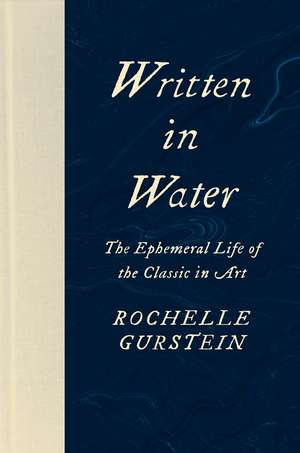Written in Water: The Ephemeral Life of the Classic in Art
Autor Rochelle Gursteinen Limba Engleză Hardback – 28 mai 2024
An Economist Book of the Year, 2024
Is there such a thing as a timeless classic? More than a decade ago, Rochelle Gurstein set out to explore and establish a solid foundation for the classic in the history of taste. To her surprise, that history instead revealed repeated episodes of soaring and falling reputations, rediscoveries of long-forgotten artists, and radical shifts in the canon, all of which went so completely against common knowledge that it was hard to believe it was true.
Where does the idea of the timeless classic come from? And how has it become so fiercely contested? By recovering disputes about works of art from the eighteenth century to the close of the twentieth, Gurstein takes us into unfamiliar aesthetic and moral terrain, providing a richly imagined historical alternative to accounts offered by both cultural theorists advancing attacks on the politics of taste and those who continue to cling to the ideal of universal values embodied in the classic. As Gurstein brings to life the competing responses of generations of artists, art lovers, and critics to specific works of art, she makes us see the same object vividly and directly through their eyes and feel, in all its enlarging intensity, what they felt.
Preț: 234.70 lei
Nou
Puncte Express: 352
Preț estimativ în valută:
44.92€ • 48.81$ • 37.76£
44.92€ • 48.81$ • 37.76£
Carte disponibilă
Livrare economică 31 martie-14 aprilie
Livrare express 14-20 martie pentru 41.35 lei
Preluare comenzi: 021 569.72.76
Specificații
ISBN-13: 9780300215489
ISBN-10: 0300215487
Pagini: 520
Ilustrații: 32 color + 20 b-w illus.
Dimensiuni: 156 x 235 x 15 mm
Greutate: 0.82 kg
Editura: Yale University Press
Colecția Yale University Press
ISBN-10: 0300215487
Pagini: 520
Ilustrații: 32 color + 20 b-w illus.
Dimensiuni: 156 x 235 x 15 mm
Greutate: 0.82 kg
Editura: Yale University Press
Colecția Yale University Press
Recenzii
“A rich, provocative work of inquiry and analysis. Anyone who is curious about what has happened to high art in the past couple of centuries, and about how we have arrived at a situation in which ‘it is hard to imagine that a classic can ever exist again as an exemplar for living artists and an agreed-on standard of taste,’ would do well to read Written in Water with the closest attention.”—Brooke Allen, Wall Street Journal
“This elegant book shows . . . that the ‘timeless classic’ is anything but.”—The Economist, Books of the Year
Selected by Wall Street Journal for “12 Books To Read,” July 2024
“The true enemy of the classic is not relativism or wokeness. It is silence.”—The Economist
“[An] outstanding book.”—Matthew Mutter, Current
“Rochelle Gurstein’s sensitive reconsideration of what we mean by a classic is a deeply personal and broadly relevant reflection on what we want from the concept when we wield it. This compellingly written study should be of interest to anyone who cares about beauty, the history of admiration, or about how cultural values change over time. It is bound to make an impact.”—Jonah Siegel, author of Overlooking Damage: Art, Display, and Loss in Times of Crisis
“With elegant clarity and erudition worn lightly, Rochelle Gurstein masterfully reconstructs the vain quest for a timeless standard of classical transcendence in the visual arts. I was smitten from the beginning and approached every new chapter with great anticipation.”—Martin Jay, author of The Dialectical Imagination, Downcast Eyes, and Immanent Critiques
“Rochelle Gurstein has asked an old question with fresh urgency: What is a classic? Her answer shows a real power of admiration, along with a rare sensitivity to the way epochal changes of taste may follow from accidental discoveries or disappointments. This is a work of cultural history that carries on every page the stamp of a restless and inquisitive mind.”—David Bromwich, Yale University
“This elegant book shows . . . that the ‘timeless classic’ is anything but.”—The Economist, Books of the Year
Selected by Wall Street Journal for “12 Books To Read,” July 2024
“The true enemy of the classic is not relativism or wokeness. It is silence.”—The Economist
“[An] outstanding book.”—Matthew Mutter, Current
“Rochelle Gurstein’s sensitive reconsideration of what we mean by a classic is a deeply personal and broadly relevant reflection on what we want from the concept when we wield it. This compellingly written study should be of interest to anyone who cares about beauty, the history of admiration, or about how cultural values change over time. It is bound to make an impact.”—Jonah Siegel, author of Overlooking Damage: Art, Display, and Loss in Times of Crisis
“With elegant clarity and erudition worn lightly, Rochelle Gurstein masterfully reconstructs the vain quest for a timeless standard of classical transcendence in the visual arts. I was smitten from the beginning and approached every new chapter with great anticipation.”—Martin Jay, author of The Dialectical Imagination, Downcast Eyes, and Immanent Critiques
“Rochelle Gurstein has asked an old question with fresh urgency: What is a classic? Her answer shows a real power of admiration, along with a rare sensitivity to the way epochal changes of taste may follow from accidental discoveries or disappointments. This is a work of cultural history that carries on every page the stamp of a restless and inquisitive mind.”—David Bromwich, Yale University
Notă biografică
Rochelle Gurstein is an intellectual historian and critic. She is the author of The Repeal of Reticence: America’s Cultural and Legal Struggles over Free Speech, Obscenity, Sexual Liberation, and Modern Art. Gurstein lives in New York City.
Descriere
A deeply personal yet broadly relevant exploration of the ephemeral life of the classic in art, from the eighteenth century to our own day
